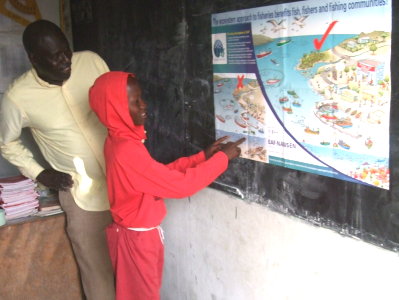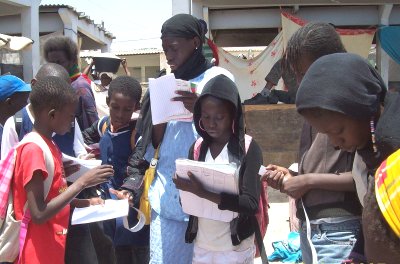The ecosystem approach to fisheries (EAF): A pathway required for the preservation of the marine ecosystem
according to Magueth Diop, Director of the Khadim School
As part of the monitoring activities of the pilot project FAO – EAF-Nansen, Aliou Sall collected the views of Mr. Diop Magueth in July 2012, just like with other schools in The Gambia and Senegal. Mr. Diop is the director of the Khadim School in Hann and actively involved in the tests to integrate the ecosystem approach to fisheries (EAF) in the school curriculum. He gives us his impressions through the interview below:
MM-Q: Mr. Diop, what represents EAF in environmental education work, which you have begun to practice in recent years in ordre to raise awareness about this dimension through your programme?
 A: No doubt, the ecosystem approach is an effective way to inform and educate pupils, the commununities and the public authorities on the protection of the seas and oceans. It is for us a mandatory way to preserve the marine ecosystem. The five principles have their own importance. That said, the key principle on the ecosystem integrity that must be preserved, has had a great and unexpected effect for us teachers and students. We are all from a community of fishermen and so we began to consider the Hann Bay, having regard to the degree of pollution, as a sick neighbour. This notion has also been integrated in the sketch, which we introduced in the competition of the departmental schools and for which we won a trophy.
A: No doubt, the ecosystem approach is an effective way to inform and educate pupils, the commununities and the public authorities on the protection of the seas and oceans. It is for us a mandatory way to preserve the marine ecosystem. The five principles have their own importance. That said, the key principle on the ecosystem integrity that must be preserved, has had a great and unexpected effect for us teachers and students. We are all from a community of fishermen and so we began to consider the Hann Bay, having regard to the degree of pollution, as a sick neighbour. This notion has also been integrated in the sketch, which we introduced in the competition of the departmental schools and for which we won a trophy.
Even if we stopped here, we think it is an important achievement. Indeed, this project, with the tools at our disposal – including the two posters that helped us a lot in our different work lines with the pupils - led to advocacy work even outside the context of our community. Even more, it also helped create collective awareness during the presentation of the sketch in three different places, like the realisation that the sea is not only made up of water. We should appreciate the fact that the sea is made only of water for people who did not have the opportunity to discover the diversity of fauna and flora that live there.
MM-Q: Is there other impacts recorded among pupils who participated last few months in this work?

A: You know, the application of such an approach allows to highlight the most intimate relationships between men and marine ecosystems. Through our experience in the Khadim School and the fishing communities in Hann who now consider Hann Bay and its waters as severely ill neighbours, we perceive in each other this fierce determination to spare no effort to heal them.
MM-Q: We know that for a few years, compared to other teachers, you have stood out for the priority you gave to traditional theater for environmental education. May we know what the EAF meant for you in this specific area?
A: At the pupils level, the ecosystem approach has significantly contributed to enhancing their artistic and oral expression enriching their vocabulary. It also sharpens their intellectual curiosity and prepares them to become future ambassadors of the marine ecosystem and especially fishermen. Ecosystem approaches are also reflected in the development of a sense of the whole and every integrating sustainable development concepts (conservation and protection of marine fry).
MM-Q: Do you want to add anything else?
A: Well, I can say that the tools provided by the project, as a rule, have allowed pupils to acquire skills that will continue to grow through the science and observation lessons, while helping to enrich their vocabulary, based on new scientific concepts, hitherto reserved for an elite of researchers. We are in a real process of popularisation of science tools regarding oceanography in general and fisheries in particular. Also, the budding collaboration between schoolchildren, fisheries managers and scientists thanks to the field trips is one of prerequisites for concrete synergies. These should result in multifaceted actions likely to love, respect and above all protect the seas and oceans, which traditionally provide invaluable food for all the inhabitants of the planet Earth, including the future generations. The role of procurement of such goods must be preserved by a responsible and sustainable management of ecosystem integrity.
MM-Q: Have you noticed a few problems, minor or major in nature, which may be some constraints in your efforts to incorporate the EAF permanently in your curriculum?
A: There have been problems as a result of the school crisis, which meant that we did not have enough time to devote to both testing the kit and then its full implementation. Otherwise, there would have been more results and products (especially the form of sketches) that our European partners could promote on their websites or online journals. But we will relaunch next school opening.
There's also another kind of logistical problem. Today, our schools are poor and this is reflected in the lack of even a minimum access to informatics tools on a more or less regular basis. Access to ICTs is also considerable support to enable our pupils to build networks with schools in Europe, particularly French-speaking ones. Finally, I also hope that the nascent network of schools participating in the project may be accompanied during the next 18 months, in order to establish a solid network that could stand on its own feet in 24 months. But this requires the facilitation of periodic capitalisation meetings during the phase of 18 months, which we planned for as the pilot phase.
MM: Thank you, Mr. Diop








